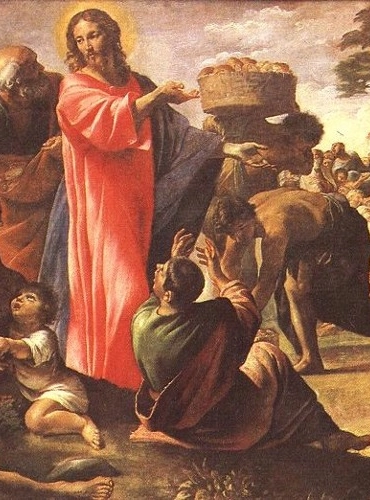Monday of the 18th Week of Ordinary Time – Mt 14:13-21
In today’s Gospel, Matthew recounts the feeding of the five thousand with five loaves and two fish. The Fathers and Doctors of the Church and early Christian writers point out a number of details regarding this miracle, and we can, in turn, apply them to our lives and, in particular, our devotion to the Eucharist. We can consider three: the five loaves and two fishes, the twelve baskets, and the hiddenness of the miracle.
First, Saint Hilary of Poitiers noted that Jesus told His disciples to feed the crowd, He of course knew that they had food. However, what they were relying on up to that point was merely five loaves, which represent the five books of the Law, and two fishes, which represent the prophets and John. This is what they offer because, at this point, they haven’t received the power to administer “the heavenly bread for the food of eternal life.” That is why Christ performs the miracle which will eventually give way to the definitive fulfillment to be found in the Eucharist. Secondly, Saint John Chrysostom noted that Jesus allowed there to be twelve baskets left over so each of the disciples would need to carry one, even, he points out, Judas. He was forced to recognize the greatness of Christ and His power. Thirdly, Eusebius of Emesa wrote that “what was done invisibly, once brought to light, proclaimed who it is that always works invisibly. It was not only at that time that Jesus with five loaves does many great things. In the world he was not idle or inactive but was always at work feeding everyone.”
The miracle of the multiplication, then, is a foreshadowing of the Eucharist. If Christ multiples five loaves and two fishes to feed thousands, how much more can His grace and power spread through the Eucharist. Our faith in that power is a barometer of our love for Christ. Fulton Sheen notes that Judas’s betrayal began with his refusal to believe in the Eucharist. As he writes, “When do priests begin to break? When they lose their faith in the Eucharist! It is not seen, it is not commented upon, a dozen other explanations will be given and the faith is generally lost long before others see the loss. . . . There has never yet been a priest, who daily kept his faith in the Eucharist by watching an hour with the Lord who ever left him; no priest ever will! And those who are thinking of leaving . . . and I have many such letters in my possession about such men, from such men, who have come back because they restored their faith in the Eucharist.”
We can ask ourselves today if we really believe in the power of Christ in the Eucharist. As Saint Alphonsus Ligouri wrote, “Realize that you may gain more in a quarter of an hour of prayer before the Blessed Sacrament than in all other practices of the day. . . . The sovereigns of the earth do not always grant audience readily; on the contrary, the King of Heaven, hidden under the Eucharistic veils, is ready to receive anyone.”
Let us pray, through the intercession of Mary, Mother of the Eucharist, for the grace to really draw near to the Eucharist and trust in Christ’s power hidden under the veils of bread and wine.






